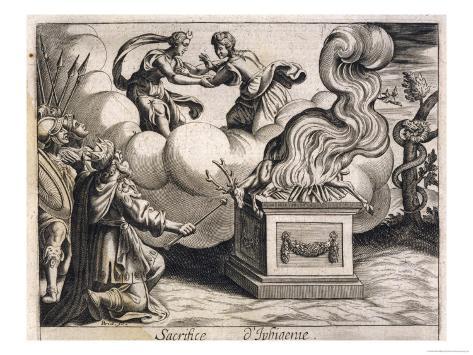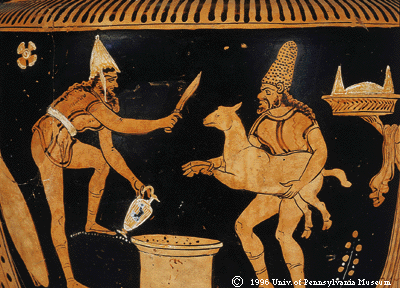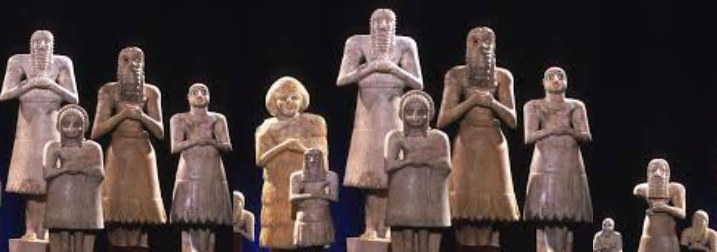A while ago I contributed to a thing in the GLoG community. This is that thing revamped.
If you just want to read the rules I would use without the acompanying musings go to the bottom of the post.
This (as well as the original thing) is heavily inspired by Arnold Kemp's post Fixing Religion.
Religion in RPGs

So in real life, Ancient Greek sacrificial practice was like a cool barbecue, people got together and hung out while singing and eating the fleshy bits the Gods didn't want (which just so happened to be the bits that taste the best to humans). People would come from all over to honor the Gods and have cook-out. It sounds like it was rad.
In fact, most religions are incredibly social affairs. Mosques often have a separate room for socializing, Holi Phagwa is celebrated together in large crowds of mostly strangers and even in the most calvinistic christian churches people come together, sing and after mass chew the fat. My devoutly calvinistic grandparents are a great example of this last one.
In sum: for most people, religion is always also about socializing and has historically always had this communal dimension.
However, in media we find religion to be mostly about zealotry, divine champions and blessings. All of these are very individualistic interpretations of religion. The only time religion isn't a social affair is when it is represented as a scam to dupe naive people (aka cults). This might make sense, from an I'm-an-atheist-and-all-the-people-I-know-are-protestant-christians point of view, but it doesn't in worlds where Gods are real, like in most fantasy RPG settings.

Less of this...
This individualistic representation of religion isn't only true for RPGs, though because of the way mechanics for religion work in most games it is particularly present in them. To players, to only things that exist are the things they can interact with, and the only way players can meaningfully interact with religion in every RPG I have seen up until now is as a source of magical power or information. And I think that sucks. Not because it isn't realistic (though I think it does contribute to religion feeling like such an afterthought in a lot of fictional worlds) but mostly because it is boring.
Gods are rad, even if they are just superhumans (though I prefer my gods to be more weird than just petty humans with super powers). So why would you ever design your game in such a way that only a select few classes can meaningfully interact with them? I think everyone should be able to opt-in when it comes to religion, without having to make that decision at the start of the game during character creation (I think this is true for magic as well, which is why my magic system isn't class restricted). And one way of doing that is by making religion in RPGs inherently more social.
..and more of this
Socializing Religion:
Treat this list of principles like you would a music album: Maybe you like all of this, maybe it isn't what you are looking for. Perhaps there is only a single principle that works for you or there could be only a few principles that absolutely don't work in your games. I figure that this is how most people consume RPG content anyway, but I might as well make it explicit.
1: Have Gods focus on Religious Communities as opposed to Individuals
All Gods that are worthy of mention don't or at least rarely judge or favor inidividual people; they only care about communities. As a random individual you are insignificant; only as part of a group are you worthy of divine attention. The motley crew of PCs in your game are considered one such a community. If they want the Gods to aid them (or see past a discretion) while they go on adventures they will all need to be in their good graces. The Gods are real, everyone knows this, so this isn't about liking the God or being on their side. It is about paying respect to an entity that can make your life incredibly miserable.
The concept of belonging to a community should be quite flexible. The main reason for this is that lots of RPGs have a rotating cast of characters. Even in games played in 5e players will adopt pets, gain allies and on rare occasion die. In games that are more deadly this idea of a flexible community is even more important.
By making membership of a community more flexible you can also rope your players into religous festivals, paying thithes and other obstacles that will give them hooks to interact with Gods, religion and groups of devout believers.
2: Provide Universal Access to Religion and Religious Power
Everyone should be able to access religion and religous power in some form. You zealot fans can keep the cleric (if you insist) as somewhat of a divine champion with a more personal bond with a particular God or domain, but they shouldn't get exclusive access to the divine. I for one think you should do away with the cleric completely, as it signals to your players that there is such a thing as the 'religion' class, but you don't have to in order to make religion accessible to all.
Universal access to religion can take many forms, but keep in mind the above: Gods of note generally don't care for individuals (except for maybe the cleric if you insist on keeping them around). Allow your players to use divine boons as a party, or hand out divine IOU's for helping a God that any member of the party can cash. If your system has divine healing magic, this is where I would put that as well, to prevent pidgeonholing one player as the 'heal-bot'. Basically, if a party is in good graces with a divine diety, anyone from the party can ask it to heal a member in the party up to a point the diety will start to get bothered. The form this takes in your system can vary.
3: Don't make Gods unequivically good
In a lot of polytheïstic religions, the Gods deserved respect and praise not because they were nice, but because they were able to do horrible things to you. You asked them to do stuff about as often as you asked them to refrain from doing stuff. You might wish death upon your enemy and thus invoke the God of Death, but later in life you might want to keep your sickly child alive, praying that the God of Death will stay away.
There are many ways you could try to achieve this. A popular way is to make Gods petty, snide and selfish. Think Terry Pratchet and Dungeon Crawl Classics. Personally, I prefer making Gods more alien. It isn't that they are selfish as much that we don't understand them, which causes them to seem indifferent or cruel.

4: Make divine power come at a cost
Gods shouldn't just do whatever you want them to, at least not without the proper sacrifices and rituals. If you want a God to act, you have to give them something they want and the same for if you want them to refrain from acting in a particular way. This means that in the example of the God of Death above, they won't slay your foe, nor spare your child for nothing.
You can work this into your game in various ways. The divine power could be something you charge up before going somewhere, performing loads of rituals as preparation for an adventure. Or it could work like a debt system, with the Gods helping you out but demanding you pay up after the fact unless you want them to smite you. You could also do something like I did in my magic system, requiring a ritual to be done in the moment with the proper materials to function as tribute.
4.1: Require players to be specific
This is only relevant if you are considering allowing your players to get divine power as preparation before a challenge. You might want to prevent them from just loading up on good graces and cashing those in whenever they feel like it. To make preparatory sacrifices a bit more of an interesting choice, have your players request aid for a specific event. Much like how you would pray for safe passage, or sacrifice for a good harvest, make your players choose for what leg of their adventure they are trying to get the Gods' favor. Is it for the journey towards the dungeon? Protection for the camp outside of it? Good fortune while delving? A safe return? Make them be specific, so they have to make meaningful decisions about where they think they could use the help the most.
5: Add as many Gods to your world as you can manage
An easy way to increase the chances your players have to deal with the divine is to increase the precense of the divine in your world. Why have players pay toll to cross a bridge if you could have them negotiate with the river's God instead?
To increase the number of Gods it might help to have minor Gods, which might actually care about individuals or small communities, allowing the party to deal with the divine on their own terms as well. Sure gaining the favor of the God of a local river isn't going to do you much good when you are far away trecking through a desert, but while you are within its domain (in the physical sense of the word) it will probably be a lot of help.
To keep this manageable, make sure you replace things with Gods, rather than adding them ontop of your workload. This is why I used the example of having your players interact with the God of a river as opposed to paying a toll for a bridge. And much like how you can make NPCs on the fly based on simple descriptors that fit your setting, you should be able to quickly roll up a God in a similar fashion.
More Gods also means more things to talk to, and I love giving my players things to talk to.

6: Make the Gods punish those who incite their ire
Your behaviour shouldn't only draw the attention of the Gods in a positive way. They should also be able to get pissed. Having to face Divine Fury is wonderful, as it gives you reasons to make the Gods come to the players, or to NPCs the players might care about.
It is important to make sure that your players get to react to pissing of a God though. Some ways to do this are:
- Have the Gods announce their Wrath and allow your players to respond (perhaps they will offer to help the God out in some way to make up for their transgression).
- Limit the Gods in how they can punish the PCs (maybe the worst they can do is put a terrible curse on them).
- Limit how easy it is for the Gods to reach the PCs (this would allow you players to outrun a God, or to avoid it by avoiding its domain).
B-side: Some loose ideas on the subject
Differentiate 'spells' from 'miracles'
One way to make religion and Gods feel tacked on is by having them be the source of magical power that will work exactly the same as the magic of non religious classes (looking at you D&D). I think it should be reinfoced in play that spells (arcane magic) and miracles (religious magic) are different.
If you require sacrifice to get access to divine power you already have some sort of differentiation, but I think you should go further than that. Miracles should not work as spells, but be things in their own right. Maybe they are more freeform, maybe they can only restore the world to its 'propper' way of being, or perhaps miracles are less dangerous but also more limited in their application than arcane magic.
Alternatively you could have spells of both kinds work uniformly, but differentiate the two in what is required to cast them. Maybe all divine magic requires long rituals, or maybe you use different resolution systems for them: spells being more swingy but with a higher power ceiling than miracles.
Irregardless of how you choose to do it, I think finding ways to make spells and miracles differ in play is important if you want your players to feel like religion isn't just another source of magic.
Have a system for Divine Intervention
I could understand wanting to reserve this for your designated religious classes, but consider allowing all characters to ask for divine intervention when they are in trouble. Personally, I think there is nothing more iconic than praying to some higher power in time of need and surviving the ordeal by what could be either a stroke of luck or divine intervention. It could be a powerful moment for the character or a hook for the GM.
To get this to rhyme with Gods only considering communities, you might want to limit this to smaller local Gods. This has the added benefit of making the range of effects of the divine intervention a lot smaller in scale. God won't smite your enemy as they are about to strike you, but it will cause them to slip. They won't ressurect you from the dead, but they might pull some strings so a doctor crosses your path as your are bleeding out.
Alternatively you could work with some sort of divine renown system. Sure the Gods don't care about just any rando, but they might care about a person that retrieved one of their holy relics. Or maybe you use level to determine how likely the God is to have heard of the PC. If you run something like the GLoG, with very low level play, you could roll a d20 to roll equal or lower than their level to see if the God noticed their plea for help. For games with higher levels, or for a world with less involved Gods you could instead roll a d100.

Tribute and Tribulation: A Guide to deal with the Divine
This is how I plan to have players in my upcoming game deal with Gods and the divine:
- The world is teeming with incorporeal Gods that each want specific things and dislike specific things. In general, Gods are believed to be orderly entities; they follow strict logic and dislike disruption or chaos.
- Because they are wholly other, Gods can only communicate through Omens, which are often not much more straightforward than 'I did like this' and 'I didn't like that'.
- To get the attention of a God you need to perform a ritual within their domain, which is often just as much a physical space as it is associated themes. People have probably got the attention of this God before, so there is almost always someone who knows what ritual you need to perform.
- Gods with large domains that get a lot of requests require large gatherings of people to partake in the ritual in order to notice you. If all members of a community join in, the chances of the God noticing you are even larger.
- If you give a God what they want, without doing something they dislike you can ask their favor for a thing you plan to do in the near future. The more impressive the gift, the more favourable the God will be towards the community that got its attention.
- Any member of the community can use some off the divine favor to aid
them in a sitation that fits the parameters of the original request.
Just say what you want and roll d6 to see how much the God actually enjoyed the ritual and offerings.
- Be wary not to get the attention of a God in their domain when a member of the community recently did something they dislike, or they will surely curse you (though this curse, much like their favor, is limited to their domain).
Notes and implications
One of my favourite aspects of the GLoG magic system is the tangibility of magic dice. You always know how much 'magic' you have left. Using a similar system for divine favor makes it so hopefully players won't forget to invoke the Gods at appropriate times.
I would make being a member of the community very flexible. This will create a world where devout areas will have a lot of social policing, creating hurdles and conflicts for your players to get roped into, which I like.
The process of getting divine favor is rather preporatory, but by limiting favor to a particular adventure and the powers of a God to a particular domain, I think there are enough restrictions to prevent players from stockpiling divine favor and making everything incredibly easy. With the current limitations in place, I would allow my players to try to 'game' this system as much as they want and then hit them with realistic complications. Maybe don't hog the attention of the God of life and death for your escapades, it might cause a famine elsewhere.
By introducing plenty of smaller Gods, I hope that engaging with the divine will still happen a lot on the fly and not just before going on the adventure. I would have to play test this for a bit to see how it actually gets used.
One thing I am still uncertain off is divine intervention. I think I would wait until it comes up in play to see how I would want to rule it, to prevent players from using it as a 'button' to press every time they are in danger. Like, I would rather the players come up with the idea that they can appeal to a God they recently helped when they are in peril, then them reading it is an option and continuously test if they have met the parameters yet.

No comments:
Post a Comment